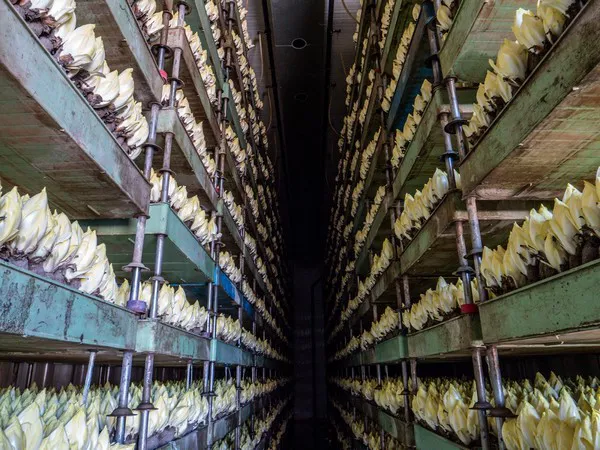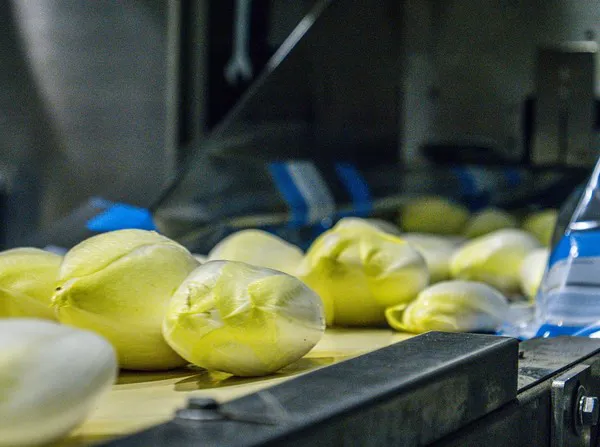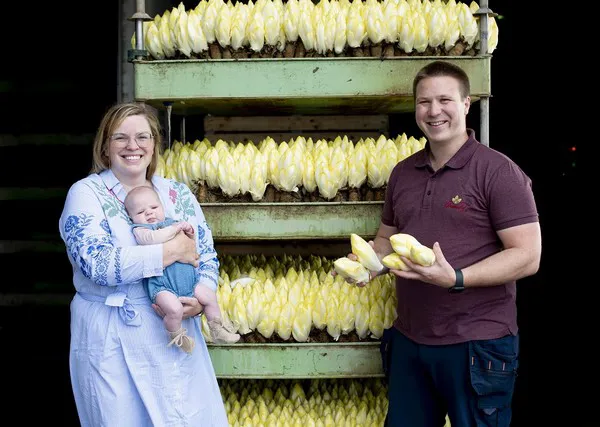This year’s Belgian chicory yield is 20% lower than usual. That could prove beneficial, even though cost prices have risen substantially. “It’s trickier than ever to find a good supply/demand balance,” begins Charles Cattoir of Primalof.
Primalof cultivates, packs, and markets chicory. This Belgian company has a production area of 180 hectares and supplies daily fresh product to the retail, wholesale, and industry sectors. Unlike Dutch chicory, most Belgian chicory is sold locally. Lower yields are expected in Flanders. “There’s about 20% less raw material due to last summer’s drought and high temperatures. Less was sown too. The same is expected in the Netherlands and France, where there should also be less production. Though, there were actually too many spears in 2021.”
More chicory to processing industry
Primalof sells more than half its chicory to retailers. The producer also supplies wholesalers and the industry, with increased sales to processors and meal producers. “It’s a growing market for us. Industry demand is more stable than that from retailers. That’s true for margins through the chain, too,” says Charles.
He is anxious about the months ahead. “There will be less chicory available everywhere. That could benefit the market, but will it be enough to compensate for the high-cost prices? I fear not. Everything has become so much more expensive—refrigeration, packaging materials, not to mention the wage increase in Belgium. Still, if we want to continue selling our product well, it shouldn’t become too pricey in stores. Supermarkets have a role to play in that too.”

Production costs still climbing
This uncertainty is nothing new. Chicory has been facing major challenges for some time. As in the Netherlands, many Belgian growers have quit in recent years, and consumption of this white leafy vegetable is falling. “Some growers stop every year, especially those doing open field cultivation. Given the energy prices and the lack of succession, and adding the imbalance mentioned above, that trend will continue. Production costs are often disproportionate to payout prices. For the remaining farms, it’s more important than ever to find a good balance. Running high production to avoid running below cost is almost inevitable, but is it worth it?” Charles wonders.
At the time of writing, in early January, the sector was in its busy transition phase from the old to new raw material in the aftermath of the festive season. The last months of 2022 ended on a positive note. From September until the holidays, chicory was selling for good prices, with the regular ups and downs. “Producers sorely needed those prices and now, noticeably, don’t feel pressured to plant new spears. Above all, the market needs calm and stability. For now, it remains to be seen how much land will be available next season. Cultivation will quiet down in March when trade and sowing start again.”

Chicory week
Charles is looking forward to the ‘Week van het Witloof’. From February 1 to 7, the Flemish Agricultural Marketing Board (VLAM) will bring extra attention to this vegetable. Throughout the week, chicory will be promoted on television, radio, and social media. There are also collaborations with supermarkets, grocery stores, and influencers. “It’s a great initiative that’s widely supported. The growers genuinely appreciated it,” he admits.
“But, will this week be beneficial this year, now that there’s significantly less product available? It would be better for the spread to call attention to it for a month. We’ll see. All the attention is good, especially given declining consumption and current inflation. Consumers are paying extra attention to their spending. Chicory is a local, sustainable product of which Belgium can be proud. That cannot be shared often enough.”
Keep innovating
Primalof employs about 50 people to control the entire process, from cultivation to directly supplying retailers. Still, they will be investing heavily in automation in the coming years. A robotized spear-planting project is underway. They are also working on harvesting and packaging automation projects. “Primalof packages its chicory immediately after harvesting in flow packs and trays. Some are even package-free,” Cattoir explains. “We have a flow pack machine which lets us pack faster and more efficiently, saving on labor. Also, the product is better protected, which improves its quality and shelf life. That, in turn, prevents food waste.”
He says they are constantly looking for innovation and improvements. The company is also evolving, sustainability-wise. Primalof generates some of the power it uses via solar panels. Plus, they collect rainwater to use for growing the chicory, and the product is sustainably cooled. Primalof has managed to shorten the chain even further. All raw materials now come from within a radius of no more than 45 kilometers.
“Improving production processes to be more efficient, continually looking for innovations within the sector; it never stops. Everything to preserve our beautiful, top-quality chicory,” Charles concludes.
For more information: Charles Cattoir
Charles Cattoir
Primalof
Leeg Bracht 23
9860 Balegem, Belgium
Tel.:+32 (0)483 48 47 17
[email protected]
www.primalof.be

